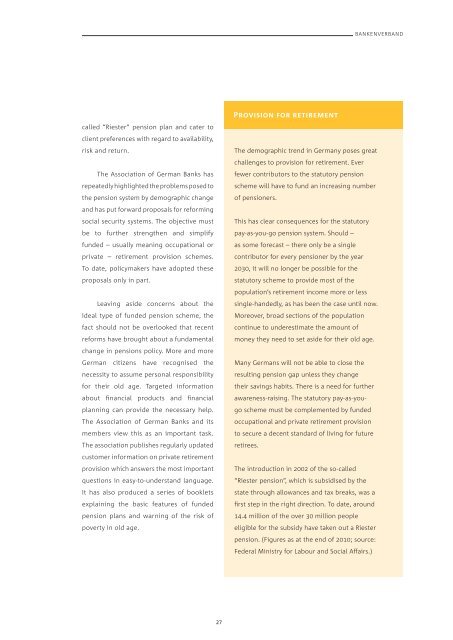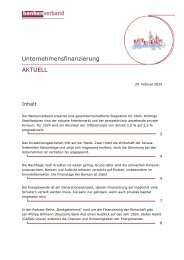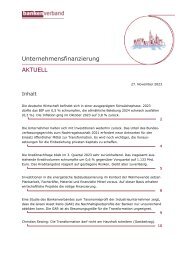Banks and Consumers
The Comprehensive Consumer Policy Scheme of the German Private Commercial Banks
The Comprehensive Consumer Policy Scheme of the German Private Commercial Banks
Create successful ePaper yourself
Turn your PDF publications into a flip-book with our unique Google optimized e-Paper software.
BANKENVERBAND<br />
called “Riester” pension plan <strong>and</strong> cater to<br />
client preferences with regard to availability,<br />
risk <strong>and</strong> return.<br />
The Association of German <strong>Banks</strong> has<br />
repeatedly highlighted the problems posed to<br />
the pension system by demographic change<br />
<strong>and</strong> has put forward proposals for reforming<br />
social security systems. The objective must<br />
be to further strengthen <strong>and</strong> simplify<br />
funded – usually meaning occupational or<br />
private – retirement provision schemes.<br />
To date, policymakers have adopted these<br />
proposals only in part.<br />
Leaving aside concerns about the<br />
ideal type of funded pension scheme, the<br />
fact should not be overlooked that recent<br />
reforms have brought about a fundamental<br />
change in pensions policy. More <strong>and</strong> more<br />
German citizens have recognised the<br />
necessity to assume personal responsibility<br />
for their old age. Targeted information<br />
about financial products <strong>and</strong> financial<br />
planning can provide the necessary help.<br />
The Association of German <strong>Banks</strong> <strong>and</strong> its<br />
members view this as an important task.<br />
The association publishes regularly updated<br />
customer information on private retirement<br />
provision which answers the most important<br />
questions in easy-to-underst<strong>and</strong> language.<br />
It has also produced a series of booklets<br />
explaining the basic features of funded<br />
pension plans <strong>and</strong> warning of the risk of<br />
poverty in old age.<br />
PROVISION FOR RETIREMENT<br />
The demographic trend in Germany poses great<br />
challenges to provision for retirement. Ever<br />
fewer contributors to the statutory pension<br />
scheme will have to fund an increasing number<br />
of pensioners.<br />
This has clear consequences for the statutory<br />
pay-as-you-go pension system. Should –<br />
as some forecast – there only be a single<br />
contributor for every pensioner by the year<br />
2030, it will no longer be possible for the<br />
statutory scheme to provide most of the<br />
population’s retirement income more or less<br />
single-h<strong>and</strong>edly, as has been the case until now.<br />
Moreover, broad sections of the population<br />
continue to underestimate the amount of<br />
money they need to set aside for their old age.<br />
Many Germans will not be able to close the<br />
resulting pension gap unless they change<br />
their savings habits. There is a need for further<br />
awareness-raising. The statutory pay-as-yougo<br />
scheme must be complemented by funded<br />
occupational <strong>and</strong> private retirement provision<br />
to secure a decent st<strong>and</strong>ard of living for future<br />
retirees.<br />
The introduction in 2002 of the so-called<br />
“Riester pension”, which is subsidised by the<br />
state through allowances <strong>and</strong> tax breaks, was a<br />
first step in the right direction. To date, around<br />
14.4 million of the over 30 million people<br />
eligible for the subsidy have taken out a Riester<br />
pension. (Figures as at the end of 2010; source:<br />
Federal Ministry for Labour <strong>and</strong> Social Affairs.)<br />
27


















